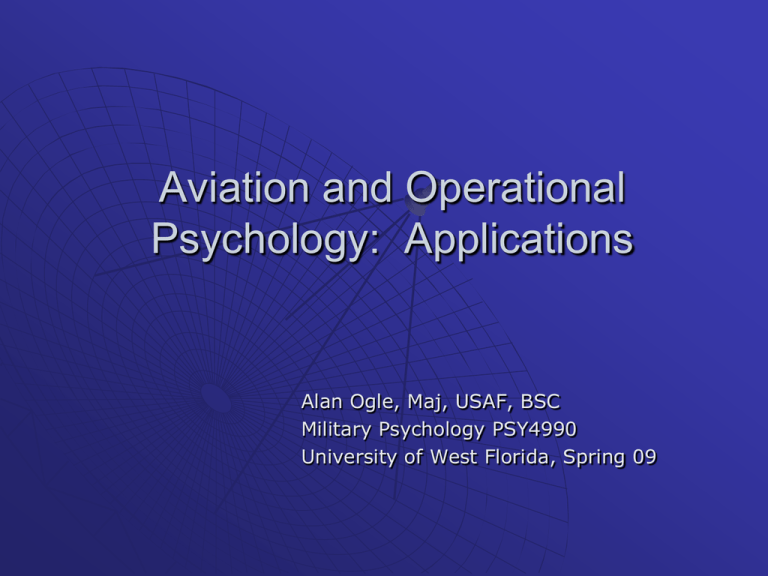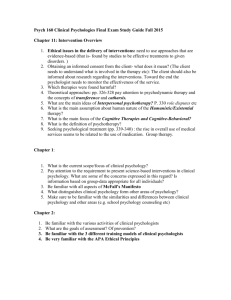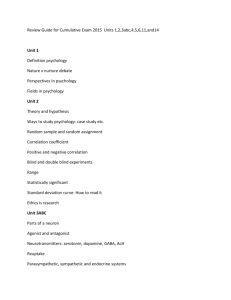Navy Operational Psychology Fellowship
advertisement

Aviation and Operational Psychology: Applications Alan Ogle, Maj, USAF, BSC Military Psychology PSY4990 University of West Florida, Spring 09 Disclaimer: information in this briefing was compiled from multiple sources in the US military medical services. Many have been modified or shortened to fit the educational purpose, format and training time available. Views expressed are those of the author and do not reflect the official policy or position of the United States Air Force, Department of Defense, or the U.S. Government. As Seen By... 31 Jan 01 Behavioral Health in Aviation Human Factors in Aviation The Role of Behavioral Health: What’s needed? Flight Surgeons want input on cases • Evaluations, recommendations, tx, summary Commanders want input on situations • Crew rest, human factors Commanders want input on individuals Individuals want information/education • Kids’ development, relationships, etc. Consultation Consult with commanders, safety officers, and flight surgeons • Human factors affecting readiness, safety, performance, and retention Provide Psycho-education • Stress & Fatigue, human factors, etc. Survey unit stress, morale and cohesion and provide feedback to command We offer more than this… Selection: Necessary Pilot Abilities Psychomotor (stick & rudder) Judgment and decision making Attention Memory Prioritization of tasks Cockpit communication WWII Psychomotor Test Air Force School of Aerospace Medicine Complex Coordination Test Pilot Candidate Selection Method Paper-and-pencil AFOQT Basic Attributes Test Previous Flying Experience + •g •Verbal •Math •Spatial •Aircrew Interest/ Knowledge •Perceptual Speed + •Psychomotor •Cognitive •Attitudes NEO-Personality InventoryRevised (NEO-PI-R) Neuroticism (N) - Level of emotional stability Extraversion (E)- Sociability, assertiveness, activity Openness (to experience; O) - Imagination, aesthetic sensitivity, attentiveness to inner feelings, preference for variety, intellectual curiosity, independence of judgment Agreeableness (A) - Altruism, sympathetic to others and eagerness to help, belief that others will be sympathetic Conscientiousness (C) - Self-control, determination Personality patterns of USAF flight students, experienced Army pilots, and elite soldiers compared to general population USAF Student Pilots Retzlaff and Gibertini, 1987 3 distinct personality clusters (MCMI and PRF) • aggressive, dominant, exhibitionistic, self-aggrandizing (21% right stuff) • achievement oriented, dominant, affiliative, high endurance and order, low aggression (58% typical stuff) • high harm avoidance, low achievement, dominance, exhibition, affiliation, and change (21% wrong stuff) Summary of Pilot Personality Patterns Military pilots are: • more achievement-oriented, outgoing, active, competitive, dominant, and • less introspective, emotionally sensitive, and self-effacing than their non-flying counterparts Pilots are more like each other than their referent group; holds for gender as well Female pilots differ from male pilots mainly on the domain of openness to experience Marital/Family Role Conflicts Pilots/Aircrew • Soldier/Warrior vs Husband/Father Somatization of emotions Denial/minimization of difficulties Not sharing emotionally difficult experiences • Work pressures vs. Home pressures • Unrealistic expectations of self and spouse Role Conflicts Female Pilots • Tend to get married later in life • Often married to another military member • Potential for unequal distribution of domestic tasks related to parenting/child care • Perception they may have to work harder at times to earn same scores Role Conflicts Aircrew Spouse • Military spouse vs. independent lifestyle • Spouse’s perception of the risk vs. reward of occupational hazards • Spouse’s support of pilot’s role in the war • Spouse’s support/ability to serves as a single parent during TDYs and deployment • Competing for time w/ unit friends/social activities Communication Difficulties Pilots/Aircrew • Problem & fact focused • Check-list approach to conflict • Difficulty attending to & identifying emotion • Emotions expressed are usually anger & frustration • Generally avoid or withdraw from discussing emotions Communication Difficulties Spouse • Spouse may have to make extreme efforts to raise awareness to problem • Pilot speak to wife as a subordinate or co-worker • Competitive approach to conflict • Judgmental, critical, patronizing approach • Minimizes spouses stressors or needs Psychological Assessment and Treatment Evaluate crew members referred by command and/or flight surgeon Evaluate, monitor, and protect aircrew from psychological stresses of flight environment Treat aircrew members • • • • Substance Abuse Adjustment Disorders Fear of Flying Stress Management Education Safety Stand-Down Days • Stress and Fatigue briefings • Suicide prevention briefings • Other topics as relevant or requested Educating “in the hangar” • Parenting, relationships, hypothetically… • “My 13-year-old is…..Is that normal?” • “Is it normal for……” Mishap Investigation Human Factors Stress Fatigue Physical considerations Equipment Environments Performance Under “Stress” Attention • Perceptual tunneling • Cognitive tunneling – narrowing mental clarity or comprehension (missed radio call) • Task shedding – entire tasks abandoned Psychomotor • Decreased tracking abilities Performance Under “Stress” Memory • Memory Capacity Declines (Short-term memory) • Memory Strategies Compromised Over Simplification Speed/Accuracy Tradeoff • New Learning Declines – Stress Related Regression Performance Under “Stress” Judgment/Decision Making Communication • Speech production (articulation, pitch, syntax) • Comprehension • Group Think Impact of Fatigue in the Cockpit Reaction time increases • Errors in timing and accuracy • Not as smooth • Slow and irregular motor inputs Attention is reduced • Lapse or “microsleeps” • Tunneling • Need enhanced stimuli • Reduced audio-visual scan Impact of Fatigue in the Cockpit Diminished memory • Recall declines • Learning declines Greater tolerance for error • Overall poor and careless performance Impaired communication, cooperation, and crew coordination • Repetitive and fragmented conversations • Misinterpretations Human Factors Analysis and Classification System (HFACS) Organizational Influences Flying Hour Program. n Optempo issues. n Unsafe Supervisory Practices Failed to Correct a Known Problem. n Integrate Risk Management into Avn Opns.. n Preconditions for Unsafe Acts CRM training. n Support Failure. n of opportunity for the soldier to fail. Unsafe Actions Failure to Follow Procedure. n Failure to practice Procedures. n Accident A-B-C’s Final Approach Typical Mishap Perception Loss of SA A-B-C’s Mishap Reality Final Approach Problems Missed Local Condition Call Marital Missed Suspense 24 hour days Newborn Weather SOS Trying to finish Masters Degree Airlines are hiring Increased OPs Tempo Reprimanded a Crew Member Anxious Defining the Domain: What is “Operational Psychology?” It’s not what you might think. Williams, Picano, Roland & Banks: Psychologists who understand strategic and tactical intelligence processes use direct and indirect assessment to: • • • understand enemy personalities and intentions facilitate intelligence operations assessment and selection for special and high-risk missions May also provide operationally focused mental health support UNCLASSIFIED / FOUO Defining the Domain: What is “Operational Psychology?” Staal and Stephenson: It is NOT a reflection of where a psychologist provides services, (such as on a ship, in the field, etc.) • Paradigm shift – some core competencies-operational psychology as an intelligence function vice a medical function • Involves psychological consultation to military commanders in order to improve operational decision making in combat or military operations • UNCLASSIFIED / FOUO Defining the Domain: What is “Operational Psychology?” Dial-Ward: Operational Psychology is: Consultative activities of military and government psychologists who directly support national security missions facilitating intelligence, counterintelligence, counterterrorism, and sensitive military special operations. • Involves skills from clinical, forensic, organizational, and consulting psychology, among others • Requires sophisticated understanding of the organizational consumer’s missions and legal authorities. • UNCLASSIFIED / FOUO Defining the Domain: What is “Operational Psychology?” Core Competencies of Operational Psychologists (1) Direct and Indirect Assessment Consumer – Strategic decision makers (agents, operators, commanders, mission planners, analysts) Methods - Direct contact, or covert observation, surveillance records, third party reports, or other records Subjects - Trainees, agents, sources, assets, adversarial targets or others who may or may not be US citizens Purpose - Suitability for missions, strategy for interacting with subject/group, recommendations for training, addressing specific problems in relationship with subject, assessment of threat or risk posed by subject - Security and Counterespionage Consultation - Support to Interrogation Operations - Assessment and Selection UNCLASSIFIED / FOUO Defining the Domain: What is “Operational Psychology?” Core Competencies (cont.) (2) Direct Support to Realistic, High Stress Training • Assessing student and instructor suitability • Recommendations regarding optimal learning • Risk-management oversight • Teaching relevant blocks of instruction • SERE Certification by JPRA (3) Personnel Recovery • Pentagon tasking, repatriation and reintegration events • Psychological support to recovered DoD assets to facilitate associated intelligence collection mission UNCLASSIFIED / FOUO Defining the Domain: What is “Operational Psychology?” Core Competencies (cont.) (4) Professional Ethics – Emphasis on: • APA Psychological Ethics and National Security (PENS) task force report • Intelligence oversight (intelligence law) • Laws of warfare Sensitivity and judgment with respect to: • Limitations of validity and reliability in assessment • Challenges of dual relationships • Distinguishing subject and client relationships • Multicultural awareness and expertise UNCLASSIFIED / FOUO Behavioral Science Consultation Team (BSCT) BSCT Mission: observe and consult to ensure safe, legal, ethical, and effective intelligence collection and detention operations at the Bagram Theater Internment Facility (BTIF) TF Commander Theater PMO Detention Operations Intelligence Collection BSCT Law Enforcement Investigation SERE Psychology: Reintegration Reintegration of Prisoners of War, Hostages, Peacetime Government Detainees, and Other Missing or Isolated Personnel through Reception, Screening, Debriefing, and support SERE Psychologists Phase I Operations Phase II Phase III-CONUS …And a Medic Came with Them





